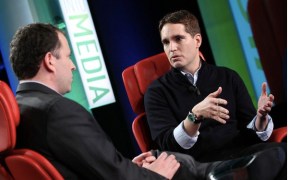
Last year, Hulu brought in $420 million in revenues, with was 60 percent above the year before. The news, however, was seen as a miss because Hulu earlier in the year suggested that it would make $500 million.
Today at the D: Dive Into Media conference, CEO Jason Kilar defended his record, revealing that “our board plan was $408 million.” So Hulu came in above the internal goal it had set for its board.
So why the discrepancy? “Earlier in the year we were pacing higher than that,” says Kilar. Then in the third quarter the ad market softened and the “pacing changed.” But he insists that there was a rebound in the fourth quarter and so far in 2012.
Nevertheless, Hulu’s subscription business, Hulu Plus, “is our fastest growing business,” says Kilar. He ended last year with 1.5 million subscribers and expects subscription revenue to become the majority of revenues this year. Those subscription dollars “allows us to pay the content business more than anyone else,” he says.
He plans on spending $500 million this year on licensing more content and creating original shows. He thinks it will be important to have a mix of exclusive shows on Hulu and a broad library in order to create some differentiation from other online video services such as Netflix, Amazon, and Apple.
Asked specifically about the auction last year for Hulu and why they didn’t sell, Kilar quipped: “Things changed.” In retrospect, he now says, “The strategic value of something like Hulu you can see dwarfing some very considerable economic considerations.”
That sounds like a post-facto justification for why Hulu didn’t attract higher bids, but Kilar is philosophical about what he is doing with Hulu and the dance he must do with the traditional media companies, some of whom are his biggest investors.
“In the late 1940s,” he notes, “everyone in California thought the television was the devil incarnate. It had to be destroyed. Walt Disney was one of the first to go to New York to find out what was this devil incarnate.” As everybody knows, TV “was one of the best things to happen to the content industry.”
Online video, he argues, will have a similar effect. “It is not different than the introduction of television when there were movie houses everywhere and people used to go to them three times a week. That is how they used to get premium content.” Now with online video, you are going from video in one room of the house to “getting premium content 24/7 wherever you may be.”
Source:http://techcrunch.com/2012/01/31/kilar-hulu-above-pla/
Today at the D: Dive Into Media conference, CEO Jason Kilar defended his record, revealing that “our board plan was $408 million.” So Hulu came in above the internal goal it had set for its board.
So why the discrepancy? “Earlier in the year we were pacing higher than that,” says Kilar. Then in the third quarter the ad market softened and the “pacing changed.” But he insists that there was a rebound in the fourth quarter and so far in 2012.
Nevertheless, Hulu’s subscription business, Hulu Plus, “is our fastest growing business,” says Kilar. He ended last year with 1.5 million subscribers and expects subscription revenue to become the majority of revenues this year. Those subscription dollars “allows us to pay the content business more than anyone else,” he says.
He plans on spending $500 million this year on licensing more content and creating original shows. He thinks it will be important to have a mix of exclusive shows on Hulu and a broad library in order to create some differentiation from other online video services such as Netflix, Amazon, and Apple.
Asked specifically about the auction last year for Hulu and why they didn’t sell, Kilar quipped: “Things changed.” In retrospect, he now says, “The strategic value of something like Hulu you can see dwarfing some very considerable economic considerations.”
That sounds like a post-facto justification for why Hulu didn’t attract higher bids, but Kilar is philosophical about what he is doing with Hulu and the dance he must do with the traditional media companies, some of whom are his biggest investors.
“In the late 1940s,” he notes, “everyone in California thought the television was the devil incarnate. It had to be destroyed. Walt Disney was one of the first to go to New York to find out what was this devil incarnate.” As everybody knows, TV “was one of the best things to happen to the content industry.”
Online video, he argues, will have a similar effect. “It is not different than the introduction of television when there were movie houses everywhere and people used to go to them three times a week. That is how they used to get premium content.” Now with online video, you are going from video in one room of the house to “getting premium content 24/7 wherever you may be.”
Source:http://techcrunch.com/2012/01/31/kilar-hulu-above-pla/

No comments:
Post a Comment